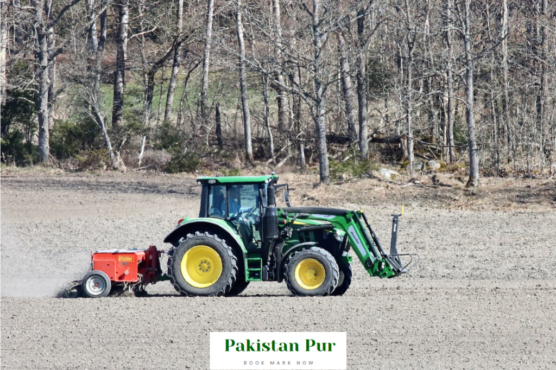
Table of Contents
Agricultural Engineering is a specialized discipline of engineering that applies scientific and technological principles to the optimization of agricultural operations, improving the efficiency of farming practices, and innovatively solving problems related to food and fiber production.
The Bachelor of Science in Agricultural Engineering (BSAE) is a prestigious degree program offered in Pakistan, aimed at cultivating the nation’s agricultural sector through engineering principles.
This comprehensive course equips students with the knowledge to optimize farming practices, manage resources effectively, and develop innovative solutions for food and fiber production.
It combines theoretical concepts with practical applications, offering a deep understanding of both the biological and technical aspects of agriculture.
By pursuing BSAE, students contribute towards the advancement of Pakistan’s agricultural industry, fostering sustainable development and food security in the country.
This Guide to Agricultural Engineering in Pakistan is a part of the series on the best degrees after FSc Pre Engineering. Read our full blog here.
Best Fields after FSc Pre Engineering in Pakistan

BS Agricultural Engineering Universities in Pakistan
These universities are offering BS or BSc in Agricultural Engineering in Pakistan. Use the search function to find a university or all the universities in a city near you.
| Institution | City | Program | Public/Private |
|---|---|---|---|
| University Of Agriculture | Faisalabad | B.Sc., 4 Years | Public |
| Bahauddin Zakariya University, Multan | Multan | B.Sc., 4 Years | Public |
| University Of Engineering & Technology, Peshawar | Peshawar | B.Sc., 4 Years | Public |
| Khawaja Fareed University Of Engineering & Information Technology | Rahim Yar Khan | BS , 4 Years | Public |
| Pir Mahar Ali Shah Arid Agriculture University | Rawalpindi | B.Sc., 4 Years | Public |
| Sindh Agriculture University | Tando Jam | B.Sc., 4 Years | Public |
| Khairpur College Of Agricultural Engineering And Technology | Khair Pur | BE (AGRI) , 4 Years | Public |
BS Agricultural Engineering Syllabus and Subjects in Pakistan
Based on the curriculum provided by various universities and educational institutions in Pakistan, here are the major subjects taught in a BS Agricultural Engineering program:
- Introduction to the Engineering Profession
- Fields of Specialization in Agricultural Engineering
- Crop Production: Major Crops
- Agricultural Machinery and Technology
- Irrigation and Drainage Systems
- Soil Conservation Techniques
- Design, Construction, and Improvement of Farming Equipment
- Plant Genetics
- Agricultural Meteorology
- Food Technology
- Horticulture
- Agronomy
- Animal Husbandry
- Entomology
These subjects equip students with a broad understanding of agricultural engineering principles and practices, preparing them for a career in this dynamic field.
HEC Syllabus for BS Agricultural Engineering
HEC has prepared a syllabus for BS agricultural engineering. The universities have limited choice in subjects and they largely follow the same syllabus in Pakistan.
Here is a list of subjects for all the semesters of BS agricultural engineering in Pakistan.
BS Agricultural Engineering: Semester 1 Subjects
- Islamic Studies
- Linear Algebra & Calculus
- Applied Physics
- Fluid Mechanics
- Engineering Drawing & Graphics
- Metallurgy and Workshop Practices
- English Composition & Comprehension
BS Agricultural Engineering: Semester 2 Subjects
- Pakistan Studies
- Engineering Mechanics
- Manufacturing Engineering
- Soil Science
- Basic Agriculture
- Computer-Aided Design
BS Agricultural Engineering: Semester 3 Subjects
- Differential Equations, Power Series, Laplace Transform
- Sociology
- Engineering Hydrology
- Surveying & Leveling *
- Computer Programming and Applications in Engineering
- Engineering Thermodynamics
BS Agricultural Engineering: Semester 4 Subjects
- Soil Mechanics
- Open Channel Hydraulics
- Farm Power
- Mechanics of Materials
- Landscape Engineering
- Farm Structures & Materials
BS Agricultural Engineering: Semester 5 Subjects
- Communication & Presentation Skills
- Statistics & Probability
- Irrigation Engineering
- Elective – I
- Environmental Engineering
- Instrumentation & Measurements
BS Agricultural Engineering: Semester 6 Subjects
- Professional Ethics
- Drainage Engineering
- Soil & Water Conservation Engineering
- GIS & Remote Sensing
- Farm Machinery & Earth Moving Equipment
- Elective – II
BS Agricultural Engineering: Semester 7 Subjects
- Machine Design
- Industrial Chemistry
- Agricultural Processing Engineering
- Elective-III
- Project & Report
BS Agricultural Engineering: Semester 8 Subjects
- Elective-IV
- Engineering Economics & Management
- Numerical Analysis
- Pumps and Tube wells
- Project & Report
Read this guide to understand the scope of BS agriculture engineering in Pakistan.
BS Agricultural Engineering Scope In Pakistan

Admission Criteria for BS Agricultural Engineering in Pakistan
If you’re considering a career in agricultural engineering, then pursuing a Bachelor of Science (BS) degree in Agricultural Engineering could be an excellent starting point.
This four-year degree program is offered by several institutes across Pakistan and is recognized by the Pakistan Engineering Council. Here’s a detailed look at the admission criteria for this program.
Basic Eligibility
Candidates interested in applying for a BS in Agricultural Engineering must have obtained at least 60% (i.e., 660/1100) marks in F.Sc. (Pre-Engineering), excluding the 20 marks reserved for Hafiz-e-Quran.
Some institutes also accept students from Pre-Agriculture or Pre-Medical backgrounds, provided they have secured a minimum of 50% marks (i.e., 550/1100).
Required Subjects
Candidates must have studied Physics, Chemistry, and Mathematics as core subjects in their secondary education. These subjects form the basis of many of the concepts taught in Agricultural Engineering.
Entrance Examination
Most colleges conduct entrance examinations as part of their admission process. The aim of these examinations is to assess the candidates’ understanding of the core subjects and their aptitude for the program.
Training Requirement
In addition to the academic requirements, some institutes also require students to undergo practical training for the award of the B.Sc. Agricultural Engineering degree.
This hands-on training equips students with the skills they need to apply their theoretical knowledge in real-world scenarios.
It’s important to note that the exact admission criteria might vary slightly between different institutions. Therefore, it’s recommended to check the specific requirements of the institute you’re interested in applying to.
BS Agricultural Engineering Fee Structure
Here is simple fee structure for the top Pakistani universities offering BS agricultural engineering. For more details, please contact the university admission office.
| University | Admission Fee | Total 1st Semester Fee | Subsequent Semesters’ fee | Total Program Cost |
| University Of Agriculture, Faisalabad | n/a | Rs. 46,750 | Rs. 37,815 | Rs. 312,000 approx. |
| Bahauddin Zakariya University, Multan | n/a | Rs. 27,400 | n/a | n/a |
| University Of Engineering & Technology, Peshawar | n/a | Rs. 60,000 | (40,000-65,000) | Rs. 414,000 |
| Khawaja Fareed University Of Engineering & Information Technology | Rs. 5,000 | Rs. 50,000 | Rs. 39,000 | Rs. 323,000 |
| Pir Mahar Ali Shah Arid Agriculture University | n/a | Rs. 14,800 | Rs. 14,800 | n/a |
| Sindh Agriculture University | n/a | Rs. 125,000 | Rs. 125,000 | Rs. 10,00,000 |
Leave a Reply